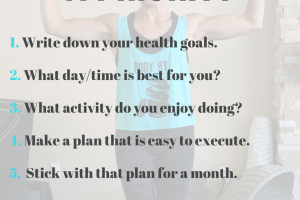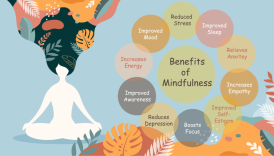Making Health a Priority: Your Guide to Balanced Living

Importance of Prioritizing Health
In today’s fast-paced world, it’s all too easy to put health on the back burner. Many individuals juggle work, family, and social commitments, often neglecting their physical and mental well-being. However, prioritizing health is not just a trend; it is a necessity for a fulfilling life. When health is considered a priority, individuals often experience higher energy levels, improved mood, and enhanced productivity. For instance, think about a time when you felt genuinely good—perhaps after exercise or a nutritious meal. That boost in spirit and ability doesn’t merely occur by chance; it’s the natural result of taking care of oneself. Here are a few reasons to emphasize the importance of prioritizing health:
- Making Health a Priority: Your Guide to Balanced Living
- Importance of Prioritizing Health
- Benefits of Balanced Living
- Nutrition
- Healthy Eating Habits
- Importance of Hydration
- Exercise
- Developing a Fitness Routine
- Benefits of Regular Physical Activity
- Mental Health
- Stress Management Techniques
- Importance of Self-Care
- Sleep
- Creating a Bedtime Routine
- Tips for Improving Sleep Quality
- Prevention of Disease: Regular check-ups and a healthy lifestyle can help prevent chronic diseases, reducing healthcare costs down the line.
- Improved Quality of Life: When health is prioritized, day-to-day activities can become more enjoyable. Simple tasks like playing with children or participating in hobbies are far more accessible when feeling fit.
- Positive Impact on Mental Health: Physical well-being often correlates with emotional stability, creating a positive feedback loop.
Benefits of Balanced Living
Balanced living encompasses harmony between physical, mental, and emotional health. Achieving this balance can lead to a range of benefits that enrich life in countless ways. Consider the following advantages of maintaining a balanced lifestyle:
- Enhanced Focus and Concentration: Individuals who embrace balanced living often report greater mental clarity, which can enhance productivity at work or school.
- Stronger Relationships: When one’s health improves, the ability to engage and connect with others also flourishes. Healthy individuals tend to inspire those around them, fostering supportive networks.
- Increased Longevity: A lifestyle that prioritizes health can lead to a longer and more fulfilling life. Engaging in healthy habits often translates into fewer limitations with age.
Achieving a balanced lifestyle may require intentional effort, but the rewards are undoubtedly worth it. It’s about small, consistent choices that culminate in significant changes over time, ultimately paving the way to a healthier, happier life.
Nutrition
Healthy Eating Habits
Building on the idea of balancing life through health, nutrition plays a crucial role in crafting a vibrant existence. Healthy eating habits are not just about following the latest diet trend; they are about fostering a genuine relationship with food. For instance, some people might remember a time when they replaced a heavy, fast-food meal with a colorful plate filled with vegetables, whole grains, and lean proteins. Not only does this change impact one’s physical health, but it also elevates mood and energy levels. To cultivate healthy eating habits, consider incorporating the following strategies:
- Eat a Variety of Foods: Aim for a mix of fruits, vegetables, proteins, and grains to ensure your body receives a broad spectrum of nutrients.
- Portion Control: Be mindful of serving sizes and listen to your body’s hunger cues. Overeating often happens when distractions, like watching TV, lead us to ignore our full signals.
- Plan Your Meals: Preparing meals in advance can curb unhealthy snacking and save money. It’s like setting yourself up for success in the kitchen!
Importance of Hydration
Hydration is another essential aspect of nutrition that should not be overlooked. It’s fascinating how something as simple as drinking enough water can have a profound effect on overall health. Many people might find themselves feeling fatigued, and oftentimes, the culprit is inadequate hydration. Drinking enough water can offer numerous benefits, including:
- Enhanced Physical Performance: Staying hydrated helps maintain optimal muscle function, especially during workouts. Think back to the last time you felt invigorated after a run—adequate hydration is often the unsung hero behind such moments.
- Improved Cognitive Function: Dehydration can lead to decreased focus and attention. Just one glass of water can sometimes work wonders during a long workday.
- Better Digestion: Proper water intake helps maintain digestive health and can prevent constipation, promoting an overall sense of well-being.
Remember, hydration needs may vary based on individual factors such as activity levels and climate. A simple trick is to carry a reusable water bottle to encourage sipping throughout the day. By prioritizing healthy eating habits and ensuring proper hydration, individuals can build a strong foundation for a healthier lifestyle.
Exercise
Developing a Fitness Routine
Transitioning from nutrition to exercise is a natural step in the journey toward a healthier lifestyle. While eating well provides fuel, physical activity helps utilize that fuel for optimal health. Developing a consistent fitness routine may seem daunting at first, but it doesn’t have to be complicated. Consider this: when someone finds a routine they enjoy, it becomes less of a chore and more of a rewarding experience. For example, a friend of mine initially dreaded working out but discovered a love for dance fitness classes. Not only did it keep her engaged, but it also turned exercise into a social event. To create an effective fitness routine, start with these tips:
- Set Realistic Goals: Aim for achievable targets, whether it’s working out three times a week or completing a specific workout duration. Gradually increase intensity as confidence and fitness levels grow.
- Mix It Up: Incorporate a variety of activities such as strength training, aerobic exercises, and flexibility workouts. This helps prevent boredom and targets different muscle groups.
- Schedule Your Workouts: Treat exercise like any important appointment by scheduling it into your calendar. This keeps you accountable and ensures consistency.
Benefits of Regular Physical Activity
The benefits of regular physical activity extend far beyond weight management. Engaging in exercise can transform one’s life in ways many never expect. Consider the following advantages of making physical activity a regular part of your routine:
- Boosted Mood and Mental Well-Being: Exercise releases endorphins, those feel-good hormones that can lift your spirits. After a brisk walk or a lively workout, it’s common to feel a sense of accomplishment and happiness.
- Increased Energy Levels: It may seem counterintuitive, but regular physical activity often leads to increased stamina and energy levels. Individuals may find themselves more alert throughout the day.
- Stronger Immune System: Regular movement can enhance immune function, making the body more resilient against illnesses. Think of exercise as a shield that helps fend off many common ailments.
By developing a thoughtful fitness routine and understanding the substantial benefits of regular physical activity, individuals empower themselves to embrace a more active and healthier lifestyle. Exercise is not just a task; it’s a path to overall wellness and vitality.
Mental Health
Stress Management Techniques
With the foundation of nutrition and exercise laid, it’s essential to turn our focus to mental health. A healthy body supports a healthy mind, but the pressures of daily life can often lead to elevated stress levels. Learning effective stress management techniques is key to maintaining emotional well-being. For instance, many individuals experience stress from work deadlines or family commitments. One way I’ve personally found relief is through mindfulness meditation. It’s amazing how just a few minutes of focused breathing can create a sense of calm amid chaos. To help manage stress, consider incorporating these techniques into your routine:
- Deep Breathing Exercises: Finding a quiet space to focus on your breath for a few minutes can reduce feelings of anxiety and help center thoughts.
- Physical Activity: Whether it’s a brisk walk or a full workout, moving the body releases endorphins that combat stress.
- Journaling: Writing down feelings and thoughts can clarify emotions and provide an outlet for stressors.
Importance of Self-Care
As we delve deeper into mental health, self-care emerges as a vital aspect of emotional well-being. In today’s busy world, self-care is often seen as a luxury rather than a necessity. However, prioritizing self-care is essential for sustaining energy and mental clarity. Think about how often we become so consumed with responsibilities that we overlook our own needs. A friend of mine created a self-care ritual where she dedicates Sunday evenings to activities that bring her joy—often taking a long bath, reading a favorite book, or practicing her hobby. The importance of self-care can be summarized with these key points:
- Rejuvenation: Taking time for oneself allows the mind and body to recharge, leading to increased productivity and creativity.
- Prevents Burnout: Regular self-care practices can act as a buffer against stress and eventual burnout.
- Improves Relationships: When individuals prioritize self-care, they often find they have more patience and energy for their loved ones, leading to stronger connections.
By integrating stress management techniques and prioritizing self-care into daily life, individuals can cultivate a more balanced and resilient mental health landscape. Embracing mental well-being not only enhances personal quality of life but also contributes positively to relationships and overall happiness.
Sleep
Creating a Bedtime Routine
As we transition from mental health to an equally important topic, sleep, it’s vital to realize that rest profoundly impacts both our physical and mental well-being. Just like developing a fitness routine, establishing a consistent bedtime routine can set the stage for better sleep quality. Reflecting on my own experience, I once struggled with inconsistent sleep patterns, often tossing and turning late into the night. After implementing a structured bedtime routine, things changed for the better. Now, I dedicate the last hour of my day to winding down, treating it as sacred time for myself. Here are some steps to consider when creating a bedtime routine:
- Set a Regular Sleep Schedule: Going to bed and waking up at the same time every day helps regulate your body’s internal clock.
- Limit Screen Time: Reduce exposure to screens at least 30 minutes before bed, as the blue light emitted can interfere with the production of melatonin, a hormone that promotes sleepiness.
- Create a Calm Environment: Make your bedroom a sanctuary. Dim the lights, keep the room cool, and eliminate noise disturbances to foster a soothing atmosphere for sleep.
Tips for Improving Sleep Quality
Once a bedtime routine is in place, it’s equally important to implement strategies that enhance overall sleep quality. Sleep is not just about duration; it’s about the quality of that sleep as well. Poor quality rest can lead to reduced energy, decreased productivity, and increased stress levels. Consider these effective tips for improving sleep quality:
- Invest in Comfortable Bedding: Quality mattresses and pillows can make a world of difference in how well you sleep. Your bed should be inviting and supportive.
- Watch Your Diet: Avoid heavy meals, caffeine, and alcohol close to bedtime. Instead, consider light snacks, like a banana or a handful of nuts, which can help promote sleep.
- Incorporate Relaxation Techniques: Engaging in calming practices such as gentle yoga, reading, or listening to soothing music can signal to your body that it’s time to unwind.
By focusing on a structured bedtime routine and implementing targeted tips to enhance sleep quality, individuals can ensure they reap the full benefits of restorative rest. A good night’s sleep is an essential pillar of overall health, contributing to improved mood, cognitive function, and physical well-being—setting the stage for a more vibrant life.





